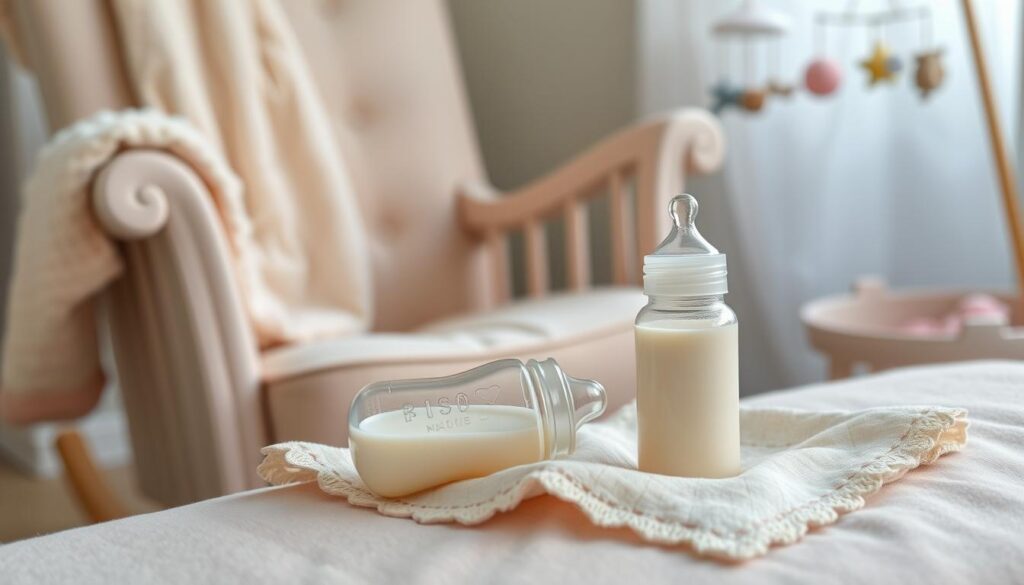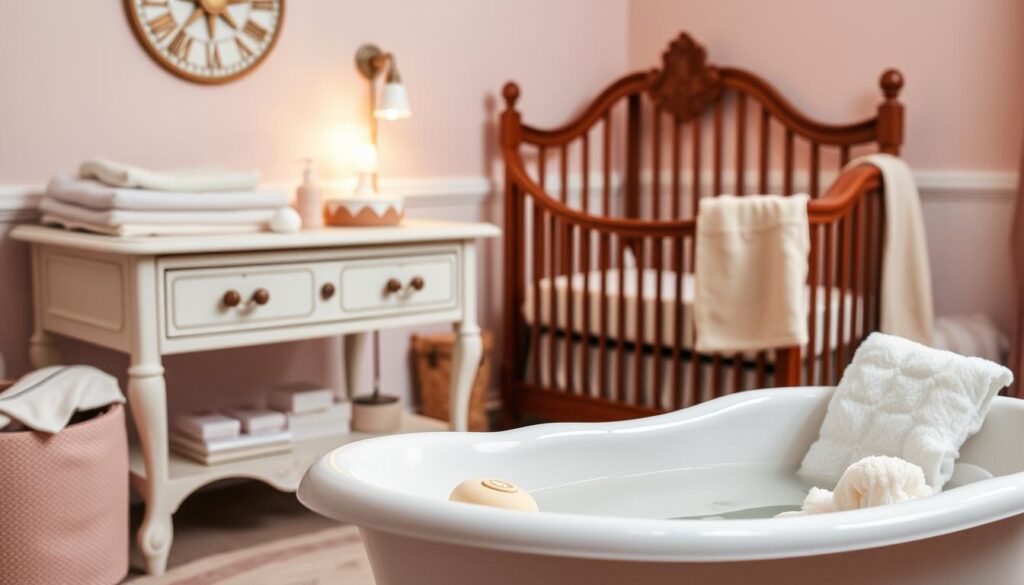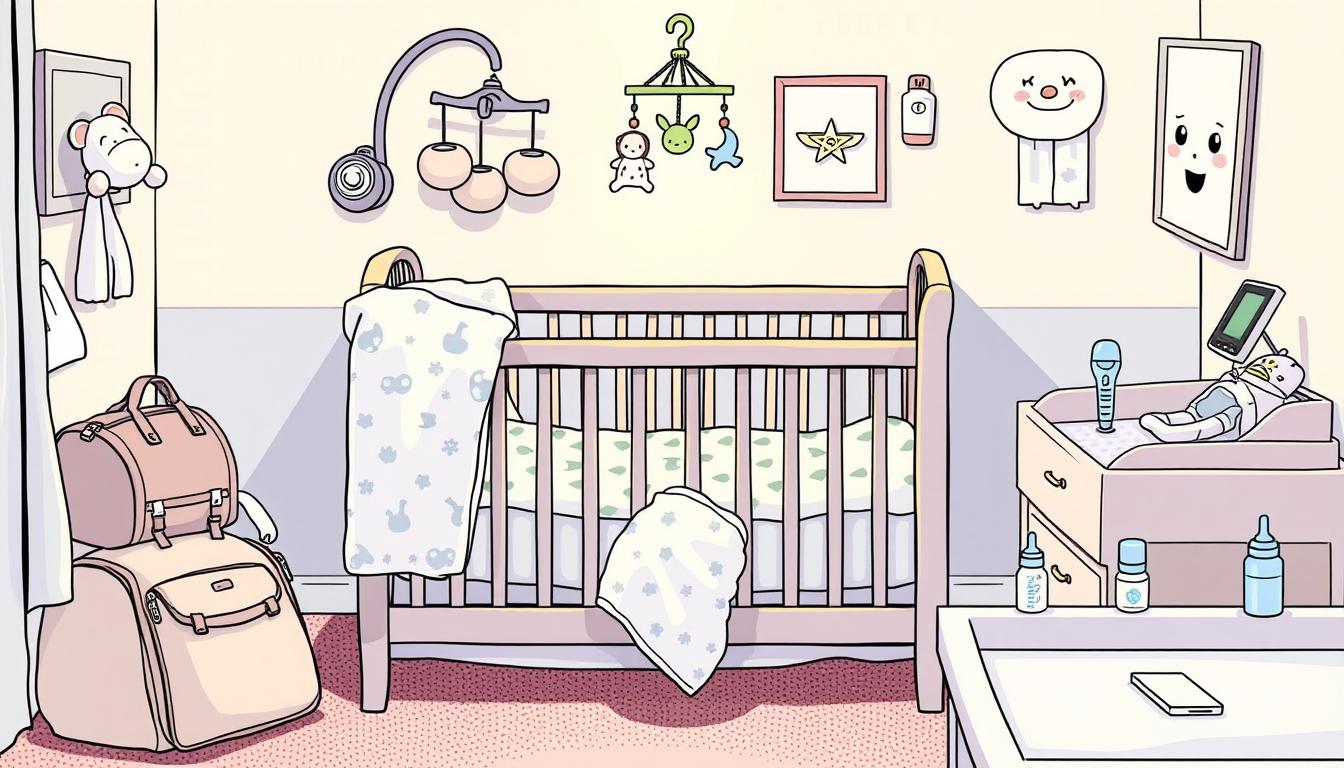Mastering the Basics: Bathing and Feeding Your Newborn

Being a new parent means learning how to bathe and feed your baby. It might seem hard at first, but you’ll get better. The American Academy of Pediatrics says to use sponge baths until the umbilical cord stump falls off1.
Bathing your baby three times a week is enough until they start moving more1. Use mild soap that moisturizes. Make sure to clean under the arms, behind the ears, and in the diaper area1.
Good care for a newborn means keeping them safe and happy. The World Health Organization says wait 24 hours for the first bath2. The American Academy of Pediatrics suggests bathing three times a week and cleaning their face and hands daily2.
As a new parent, I want to give my baby the best care. Learning how to bathe and feed them is key for their health.
Key Takeaways
- Mastering the basics of bathing and feeding is essential for newborn care
- Bathing a newborn three times a week is sufficient until they become more mobile1
- Sponge baths are recommended until the umbilical cord stump falls off1
- Using mild and moisturizing soap is important for newborn skin1
- Waiting 24 hours after birth for a newborn’s first bath is recommended by the WHO2
- Providing a safe and nurturing environment is vital for newborn essentials
Essential Newborn Bathing Techniques
Being a new parent means learning how to bathe your baby right. It’s key for their health and safety. The Mayo Clinic Staff says a clear guide is needed for a good bath time3.
For bathing, you’ll need soft things like a washcloth and towel. The American Academy of Pediatrics (AAP) says to keep vernix on for a bit to avoid dry skin, which is very important for preemies3. Also, using gentle soap and not bathing every day helps keep your baby’s skin healthy.
Here are some important tips for bathing your newborn:
- Wait until 24 hours after birth for the first bath, if you can3
- Use water that’s warm, about 100 F (38 C)4
- Keep your baby’s head and neck safe during the bath3
- Don’t use bath seats because they can tip over and be dangerous3
By using these tips, you can make bath time safe and fun for your baby. Always put your baby’s safety and comfort first. If you’re worried, talk to your pediatrician about your baby’s health and bathing4.
Understanding Your Newborn’s Feeding Needs
Being a new parent means knowing how to feed your baby right. It’s key to know when your baby is hungry. They might move their head, open their mouth, or stick out their tongue5.
A big step is when they nurse 8 to 12 times a day in the first weeks. They should not go more than 4-5 hours without eating5.
The American Academy of Pediatrics says to breastfeed for the first 6 months5. Breast milk has the right mix of vitamins and iron for babies. But, it lacks vitamin D, which might need supplements5.
Newborns have 6-8 wet diapers a day to show they’re eating enough5. They need 8 to 12 feedings a day. This means eating every two to three hours6.
During growth spurts, babies might eat more or want to eat more often6. By the fifth day, they should have at least six wet diapers and three or more bowel movements a day6.

Every baby is different. It’s important to listen to your baby’s needs. If breastfeeding is hard, get help from a lactation consultant or your doctor6.
By following these tips, you can make sure your baby gets the best care.
Creating the Perfect Feeding and Bathing Schedule for Your Newborn
Being a new parent means setting up a daily routine. This routine helps with feeding and bathing your newborn. It makes caring for your baby easier. Knowing when to feed your baby is key for their growth.
Tracking your baby’s eating, sleeping, and alert times is important. It helps you understand their natural rhythms. This way, you can spot any patterns in their behavior7.
It’s vital to listen to your baby’s cues. This helps you figure out what they need. Experts say babies start to follow a schedule between 2 and 4 months7.
Here are some tips for a feeding schedule:
- Start with small, frequent feedings, about ½ an ounce to 1 ounce per feeding in the first few days8
- Gradually increase the amount of formula or breast milk as your baby grows, with 4 ounces per feeding by 1 month and 5 ounces per feeding by 3 months8
- Be flexible and adjust the schedule as needed to accommodate growth spurts, milestones, and age-related changes
Creating a bedtime routine is also important. It helps your baby learn the difference between day and night. This can help them develop better7. Remember, every baby is different. It might take time to find the right routine for your baby.

Conclusion: Building Confidence in Your Newborn Care Journey
Being a new parent is a big job. But, it’s easier when you know how to care for your baby. By listening to your baby’s needs9 and being flexible10, you can do great. Remember, every family is different, so what works for one might not work for another10.
Self-care is very important. It helps you be a better parent. Taking time for yourself makes you more patient and attentive10. With help from family and experts, you can feel confident in caring for your baby.
As you keep going on this journey, be thankful for all the help you get. Embrace the challenges and enjoy the special moments. You can face this adventure with confidence and happiness10911.
FAQ
How often should I bathe my newborn?
The Mayo Clinic Staff says bathe your newborn three times a week. The American Academy of Pediatrics suggests sponge baths until the umbilical cord stump falls off.
What supplies do I need for bathing my newborn?
You’ll need a soft washcloth, towel, and baby shampoo for bathing. Make sure the water is warm, about 100 F (38 C). Also, support your baby’s head and neck during the bath.
How often should I feed my newborn?
Newborns need to eat every 2-3 hours, says the American Academy of Pediatrics. Skin-to-skin contact can help with milk production for breastfeeding moms.
What are the different feeding techniques for newborns?
Newborns can be breastfed or formula-fed. You’ll need a comfy nursing chair or bottle-feeding gear for a good feeding session.
How do I establish a daily routine for my newborn’s feeding and bathing?
Create a consistent feeding schedule and listen to your baby’s cues. Newborns sleep 14-17 hours a day. A bedtime routine helps them know it’s sleep time.
How can I build confidence in my newborn care journey?
To feel confident, set up a daily routine and understand your baby’s needs. Get help from lactation consultants or breastfeeding groups. This way, you and your baby will be happy and healthy.
RELATED POSTS
View all


